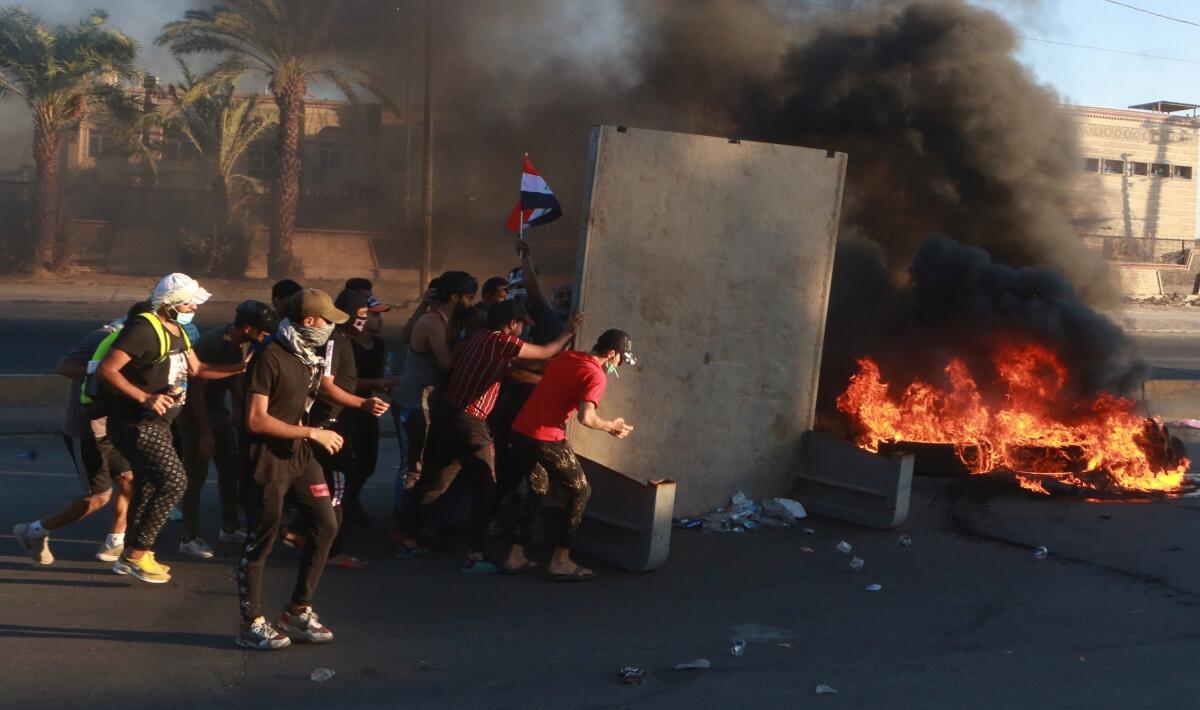Violence escalates in Iraq even after top cleric urges calm; at least 17 protesters killed

- Share via
BAGHDAD — Security forces opened fire directly at hundreds of anti-government demonstrators Friday in central Baghdad, killing at least 17 protesters and injuring dozens, hours after Iraq’s top Shiite cleric warned both sides to end four days of violence “before it’s too late.”
The latest deaths raised to 59 the number of people killed in clashes during ongoing protests and marked a sharp escalation in the use of force against unarmed demonstrators.
But neither the government nor protesters appear to be willing to back down from the violence that has presented the most serious challenge for Iraq since the defeat of the militant group Islamic State two years ago.
Spontaneous rallies, which began Tuesday, started as mostly young demonstrators took to the streets demanding jobs, improved services such as electricity and water, and an end to corruption in the oil-rich country.
In a desperate attempt to curb massive rallies, authorities blocked the internet and imposed an around-the-clock curfew in the capital.
But the protesters, many of whom camped on the streets Thursday night, gathered before noon near Tahrir Square in defiance of the curfew.
Following Friday prayers around sunset, the number of protesters grew to more than 1,000 and forces opened fire on side streets to prevent more people from reaching the square, which was sealed off.
Security forces hit two people in the head and killed them, according to witnesses and security and hospital officials. The military’s media arm also said two policemen and two civilians were killed by sniper fire.
Rasoul Saray, a 34-year-old unemployed Baghdad resident who wore a green mask, vowed to continue protesting despite the crackdown.
“I am taking part in the demonstrations because of unemployment and corruption,” Saray said.
As Iraqi journalists were interviewing another protester in the square, a policeman opened fire and wounded the youth in the leg. None of the journalists were hit.
On Friday, in his first comments since the protests began, Iraq’s most senior Shiite Muslim spiritual leader, Grand Ayatollah Ali Sistani, urged both sides to end the violence and blamed politicians, particularly lawmakers, for failing to enact promised reforms related to the economy and corruption.
“The government and the political sides have not fulfilled the demands of the people to fight corruption,” Sistani said in a sermon delivered by his representative Ahmed Safi in the Shiite holy city of Karbala.
Sistani, who is looked to by many across Iraq’s predominantly Shiite south for guidance, urged the government to “carry out its duty” to ease people’s suffering and reiterated his call for a committee of technocrats to make recommendations on fighting corruption as a way out of the crisis. He also singled out the leaders of the two biggest parliament blocs.
In another blow to Prime Minister Adel Abdul Mahdi’s year-old administration, influential Shiite cleric Muqtada Sadr called on his government to resign and hold early elections, saying in a statement that the shedding of blood of “Iraqis cannot be ignored.”
Earlier, Sadr asked members of his coalition, which controls the largest bloc in parliament, to boycott sessions until the government puts forth a program acceptable to the people.
Abdul Mahdi has given orders for the curfew to be lifted at 5 a.m. local time Saturday.
In an address to the nation, he said the protesters’ “legitimate demands” had been heard, adding that the security measures used against the demonstrations were like “bitter medicine” that needs to be swallowed.
He said there was “no magic solution” to Iraq’s problems but pledged to work on laws granting poor families a basic income and fighting corruption.
Abdul Mahdi’s government has been caught in the middle of increasing U.S.-Iran tensions in the region. Iraq is allied with both countries and hosts thousands of U.S. troops, as well as powerful paramilitary forces allied with Iran.
But in Nasiriya, protester Haidar Hamid dismissed the prime minister’s speech, saying he was looking to Shiite religious leaders for a resolution.
“If the government is not dissolved, we will avenge our martyrs,” said Hamid, who is 32 and unemployed.
More to Read
Sign up for Essential California
The most important California stories and recommendations in your inbox every morning.
You may occasionally receive promotional content from the Los Angeles Times.










